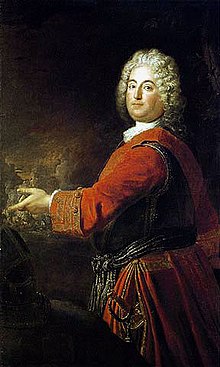Christian Ludwig of Brandenburg-Schwedt
| Christian Ludwig of Brandenburg-Schwedt | |
|---|---|

Christian Ludwig wearing the red tunic of his Infantry Regiment, painting by Antoine Pesne (about 1710)
|
|
| Born |
14 March 1677 Berlin, Brandenburg |
| Died | 3 September 1734 (aged 57) Malchow, Brandenburg |
| Burial | Berlin Cathedral |
| House | Hohenzollern |
| Father | Frederick William, Elector of Brandenburg |
| Mother | Sophia Dorothea of Schleswig-Holstein-Sonderburg-Glücksburg |
| Occupation | Military officer |
Christian Ludwig (14 March 1677 – 3 September 1734), a member of the House of Hohenzollern, was a Margrave of Brandenburg-Schwedt and a military officer of the Prussian Army. The margravial title was given to princes of the Prussian Royal House and did not express a territorial status. He is best known as the recipient of Johann Sebastian Bach's Brandenburg concertos.
Born in Berlin, Christian Ludwig was the youngest son of the "Great Elector" Frederick William (1620–1688), ruler of Brandenburg-Prussia, and his second wife Princess Sophia Dorothea of Schleswig-Holstein-Sonderburg-Glücksburg (1636–1689). Like his elder brothers, he inherited large estates around Schwedt, Vierraden and Wildenbruch his mother had acquired to provide for her sons, while according to the Hohenzollern primogeniture principle the rule over Brandenburg-Prussia passed to Frederick-William's first-born son, Crown Prince Frederick III, who became King in Prussia in 1701.
Even in Brandenburg-Schwedt, however, he had to accept the prerogative of his eldest brother Margrave Philip William. Moreover, sober times began in 1713 with the accession of King Frederick William I, known as the "Soldier King", who enlisted large financial resources to build up the Prussian Army. Nevertheless, Christian Ludwig, interested in the musical works of Georg Frideric Handel, was able to maintain a court orchestra at the Berlin City Palace. He also was vested with the manors of Malchow and Heinersdorf, earning him a regular income and an officer commission.
...
Wikipedia
